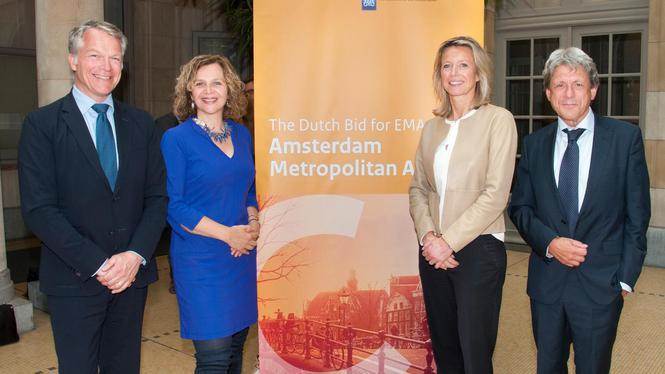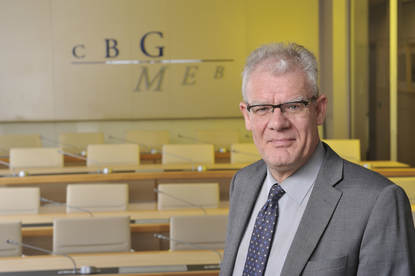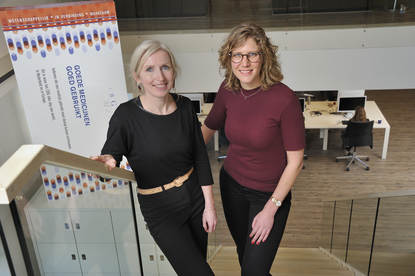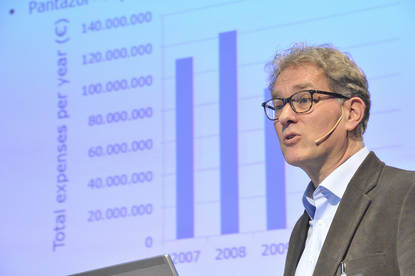The realisation that the European Medicines Agency (EMA) is coming to the Netherlands is gradually dawning on the Medicines Evaluation Board (MEB). Director Hugo Hurts: “I don't expect that it will be as exciting again soon as it was in 2017. It was a year in which the MEB had to work out and manage the uncertainties and risks surrounding the EMA and Brexit. Clarity came at the end of 2017; we know where the EMA will be going to. And we are going to prepare ourselves for the worst-case scenario: a hard Brexit.”
Three voting rounds and a draw by lot were necessary for the European ministers of foreign affairs to designate Amsterdam as the new location for the EMA on 20 November 2017. Hugo Hurts succeeded in regarding that particular Monday as a normal working day until around five o'clock. Then he could no longer ignore the many messages that were being sent in various chat groups. “There was a special atmosphere in our building that evening. Many people had stayed. Once the voting rounds began, it was excruciatingly exciting. After the second round, I thought ‘now we got it'. But then it didn't go that way. Nobody could have predicted that it would turn out like this. I myself belonged to the small group of people who thought that we might possibly succeed. But, I certainly needed more than a week to actually realise that we really had succeeded!”

We conducted a very low-key, unpretentious and persevering campaign in 2017.
Strong Dutch campaign
“We conducted a very low-key, unpretentious and persevering campaign in 2017. We did this well. In my 30 years of experience in the public sector, I have never encountered a project where people worked together so unanimously. I think that the Netherlands should consider itself fortunate that Wouter Bos acted as the ambassador for the Dutch candidacy. One of the first things that he did was to go talk to the MEB. He made use of our expertise and our good reputation. He went on his way with the MEB's offer to work together with other countries. To help them and to divide the work more fairly. That helped.
That fact that the EMA is going to be located in Amsterdam, in fact only has positive aspects. We must however understand that leaving London is a step that has an enormous impact on EMA employees. Of course they worry about the question whether they find a good house in Amsterdam or a school for their children. But if you place the map of London over Amsterdam, then you will see that the map of London covers the whole west of the Netherlands. You can live in a number of smaller or bigger places - urban or rural - where all facilities including schools are present, within an hour's commute from the EMA.”
Effect of the arrival of EMA on MEB's position
“The long period of uncertainty has been difficult for the EMA. The EMA must have been very relieved when it became clear that they were being relocated to a country that can ensure the continuity of its activities. The EMA reviewed all its activities in 2017 and determined which projects will receive less attention in order to ensure the continuity of the work. Everything focuses on the functioning of the scientific committees; the CHMP, COMP and the CVMP; their functioning may not be jeopardised. This is the core of the EMA.
We do not yet know what EMA's relocation to the Netherlands will mean for the MEB's position. However, there are a number of things you can conceive of. Central procedures have to be divided; countries can indicate whether they wish to become reporters or co-reporters. And there are popular and less popular procedures. In the past, the UK often took care of the less popular procedures. These are the products that are often less interesting from a scientific perspective, there is less work involved in these. We can handle this. It could also be the case that if they need a chair for a new working group that they simply call the MEB. The Dutch experts are within reach for the EMA. I consider it very likely that we will be a lot busier at the MEB.”
One incredibly important thing for the MEB to work on in 2018 is ensuring that work within the European network can continue uninterrupted, when Brexit causes our British colleagues to leave the network, and that is a major challenge.
The British do a great deal in the European network, and we will be at the forefront of countries that need to make up for it, first of all, but we've also taken steps, so that we won't go it alone.
We've offered to help partners in the network take on a bigger role in the network, share our knowledge and provide training. The international cooperation programme we've started to this end must also yield results, and I have high expectations.
I'm sure, and requests are coming in, that many people will also look to the MEB when it comes to the role we, as a regulator, can play in facilitating pharmaceutical innovation in the Netherlands, with the EMA.
The EMA has always said they'd like to be in a country with a strong regulator. Everyone considers the MEB to be a strong regulator, so this is an opportunity to show what we can do, and we shall.
What are the scenarios, where is the work going to, what are the deadlines when the Brexit is realised on 29 March 2019?
Consequences of Brexit for medicines authorities
The Netherlands is going to be missing an important partner when the UK leaves the EU, Hurts states. “In 2017, we participated in the discussion what the Brexit means. What are the scenarios, where is the work going to, what are the deadlines when the Brexit is realised on 29 March 2019?
At a certain point, a list of procedures was drawn up that the UK could still complete before 29 March 2019. This is a rather important decision; they are no longer receiving any CHMP and CVMP procedures since the summer of 2017. But how can you continue to work together with the UK? You do not want the situation that a pharmaceutical company starts the procedure for the authorisation of a medicine in the UK and that when the hard Brexit occurs on 29 March 2019, the company is told on 30 March 'Sorry, the procedure is no longer valid, you will have to start again’. That is not acceptable. There is an even bigger problem on a decentralised level. There are thousands of procedures for which the UK is a Reference Member State (RMS) and is responsible for the assessment and recognition of the medicines. It is difficult to ascertain whether there is enough capacity in the European network to take up the UK's work and whether pharmaceutical companies will contact other countries in time,” Hurts explains.
Working hard on the preparation for Brexit
The MEB took a number of measures in 2017 to prepare for the extra work that will possibly be assigned to the MEB. The organisation's capacity is extended with temporary financial support from the Ministry of Health, Welfare and Sport. But the MEB has also focused on strengthening the European network from within. To ensure a better division of the activities between the European medicines authorities, on 1 September 2017 the MEB, supported by the the Dutch government, offered agencies to help them further establish assessment capacity and training. These are primarily the authorities from the smaller Member States that joined the EU relatively recently. The MEB expected five countries; however, 10 Member States have already joined this initiative.
To train the MEB staff and the colleagues from other countries, a lot will be happening at the MEB as from late 2017. "A big challenge", according to Hurts.
“We already play a prominent role in the network. We do not necessarily have to grow. We want to be an outspoken player. In the long term, fewer procedures will be carried out by large agencies, but more by a number of countries together. We wish to use the MEB International Collaboration Programme to create solid partnerships with other countries to cooperate either on a bilateral or multilateral basis in the coming years. This is one of the things we undertake to prepare for an uncertain future. But we also have to remain flexible in our organisation. Because we also have to be able to downscale if things turn out to be different than we expect.”










